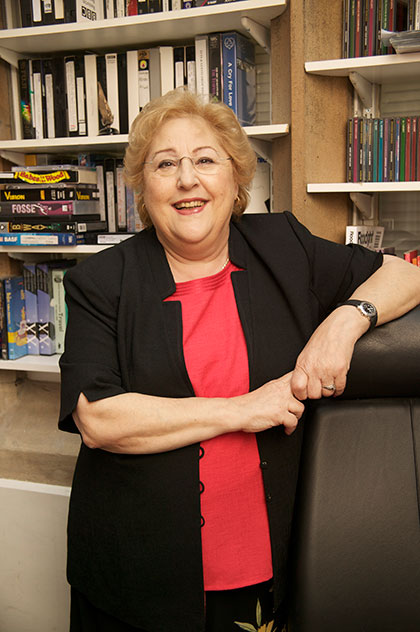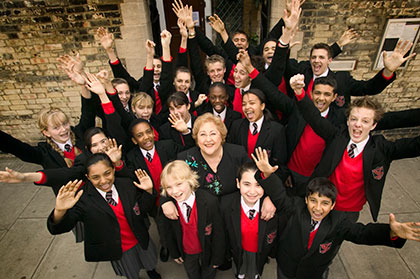Slyvia Young OBE, the doyenne of theatre education for children, talks to SUSAN ELKIN about her life, future plans, and why her love for the theatre is as strong as ever.
Appointed OBE for services to education in 2005, Sylvia Young, 76, founded and runs the country’s best known and most successful full-time theatre school for 10-16 year-olds. Amy Winehouse, Billy Piper, Laetitia Dean, Denise Van Outen, Naomi Campbell, Tony de Freitas, Daniella Westbrook (“She did her history GCSE in the morning and her Eastenders interview in the afternoon – and got them both,” says Sylvia) have all passed though Sylvia Young Theatre School (SYTS).
I chat to Sylvia, whom I’ve met many times, in her busy office. “I like to be in the same room as my key staff so that I know exactly what’s going on,” she says, cheerfully waving a hand at the four colleagues and two dogs in the room.
SYTS, which currently has 240 pupils, marks its 35th anniversary this year. Today it is housed in a magnificent and spectacularly well converted Christian Scientist Church just off Edgware Road. The stained glass is intact and original Corinthian pillars perforate the floors and ceilings on the upper levels. Beginnings, however, were humble.
“I started by running fundraising activities at my daughters’ primary school, Aldersbrook in Wanstead. We did a show. The kids loved it and wanted more so soon we were doing after school classes,” recalls Sylvia who was born in Whitechapel in 1939 and married post office engineer Norman Ruffelle in 1961.
Almost every child on the SYTS roll gets some professional work during their time at the school
Young herself had earlier fallen in love with plays in an unlikely way. “I was the eldest of nine in a three-bedroom council house, so I went to the library every day, partly for a bit of piece and quiet. I read avidly and hated Wednesdays and Sundays when the library was shut.” She also railed against the closure of the junior library before she was ready to go home. “But as a concession they let me use my junior ticket in the adult library but only for non-fiction. So I read hundreds of plays – Dewey System 822.08 – because they were the nearest thing I could find to novels.”
After leaving school at 16 and taking a clerical job (“While I waited for a library job to come up”) she went to Mountview Academy of Theatre Arts, before it became a full time drama school, and took part in its four week part-time repertory theatre course. “It was great training although my stage fright made performing difficult, but we all had to take turns in every aspect of making theatre on a four week cycle playing to our individual strengths. I wasn’t much good at set building so I spent a lot of time in the kitchen making tea and sandwiches for those who were.”
Only 15 years later, after a spell as a housewife bringing up two daughters, Sylvia had so many children keen to work with her – Sylvia’s ‘Young’uns’ (which is how she got her name) – that she began to wonder if she could do it full-time. With a friend who was a deputy head in a state school, she hired a hall in Drury Lane and advertised. “And suddenly I found myself in charge of the education of 29 children aged 8-16,” she says.
At first the education was liberally casual. “We had wild and wonderful teachers although they were all very highly qualified,” she chuckles. “The maths teacher would take them onto the flat roof to do vehicle surveys and if a teacher failed to turn up we’d send them off round Covent Garden to look at art. Time Out was our bible and we did lots of ad hoc trips to galleries, exhibitions and talks.”
League tables put a stop to all that of course. “These days we have to be absolutely clear that we offer rigorous academic education. And our GCSE results are high,” she says, praising Frances Chave, the school’s headteacher who “does wonderful work with every child, especially bearing in mind that there’s no academic selection and many students need extra help. We select them entirely on the basis of performing arts potential.”
“Whatever they do in the future performing arts sets them up for life as confident human beings”
They clearly get it right too because almost every child on the roll gets some professional work during their time at the school. All pupils are automatically signed to the Sylvia Young agency. It works well. Whenever you see a show with children in the cast, at least one or two of them are usually from SYTS.
By 1983 Young needed more space and the school moved to a former CoE primary school in Rossmore Road, Marylebone where SYTS remained for 22 years until finding its current premises.
For Sylvia and Norman – married for 54 years – the school is much more than a job. They sold their house to help finance the costly move in 2010 and now live on the top floor over the shop. “We’re the caretakers,” she says adding that she loves being able to pop home at lunchtime to switch off for half an hour if she feels like it. And she seems very content to keep it simple. “Norman and I have never had expensive tastes,” she said in one recent interview, which is probably why she can choose to offer fee concessions to so many students in the form of bursaries and scholarships.
Yes, many SYTS pupils will go on to work professionally in the performing arts industries but their general education is in safe hands too. The new building includes a fine academic area where the pupils work intensively with Chave and her colleagues on Monday, Tuesday and Wednesday. And that time is, in Young’s words, “sacred”. Then Thursday and Friday are devoted to performing arts training in the school’s light, airy and large studios and in its other fine facilities. Also offered at the school are summer schools and part-time Saturday classes for children, and a weekly class for adults.
Plans for expansion are afoot. “We hope to start a post-16 department in the next two to three years,” Young explains proudly. “Some of our own pupils might choose to stay on and we shall recruit from outside too. They can’t go to drama school until they’re 18 so they need interim training. At the moment we send 16 year-olds to Tring Park School for Performing Arts, Hurtwood House School, Laine Theatre Arts, Urdang Academy and many more.” Later, former Sylvia Young students often go to schools such as RADA, LAMDA and Bristol Old Vic.
Young is also justly proud of her own family. Her elder daughter Frances Ruffelle (born 1965) is an esteemed musical theatre performer, the original Tony award-winning Eponine in Les Miserables, although famously she didn’t behave acceptably in her mother’s school and was expelled. Young’s younger daughter Alison Lee (born 1967) is a theatrical agent, with a track record as actor Alison Ruffelle. And Young has four grandchildren, one of whom is the pop singer Eliza Doolittle.
There can’t be many people who have changed the lives of as many children as Sylvia has. “Whatever they do in the future performing arts sets them up for life as confident human beings,” says this famous martinet, quasi-grandmother to thousands, businesswoman and philanthropist whose only regret is that she didn’t keep a diary “because I’d like to remember everything and I can’t”.
I’ve never seen Sylvia in anything other than businesslike smart suits setting an example to her pupils who all look neat in their red and black uniforms. This time, in a pretty green skirt suit, she looks like a retired senior civil servant en route to work on an advisory committee. In fact she’s a hands-on principal rarely away from her school and au fait with everything which goes on in the education, training and career development of the youngsters she’s responsible for.
Sylvia Young’s homely bearing and self-deprecating manner belie the razor sharp mind, grit and determination – her pupils, who address her as “Sylvia” often describe her as “lovely but strict” which has driven her to launch and develop what is probably Britain’s most successful start-up school in the second half of the 20th century.




